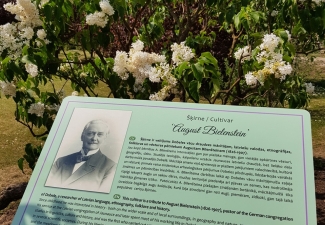Lilac cultivar is named after a tribute to August Bielenstein

Wir, Wissenschaftlers aus dem Institut für Gartenbau freuen uns sehr, Sie in unserem wunderschönen Fliedergarten begrüßen zu dürfen. Heute hier werden wir einem wunderschönen weißen Flieder der Name geben. Der bringt den Namen August Bielenstein, der eine sehr wichtige Person für uns, die Einwohner von Dobele, ist.
Es dauert mehrere Jahrzehnte, bis eine neue Fliedersorte entsteht. Pēteris Upītis, der Begründer diesen Garten, hat damit begonnen, diese Sorte zu schaffen, doch bis jetzt hat die Wissenschaftlerin des Instituts, die Züchterin Sarmīte Strautiņa, diese Sorte geführt.
Jetzt möchte ich gern Sarmite zusammen mit Wolfram Bielenstein eine Gedenktafel enthüllt bitten, auf der jeder Besucher des Gartens nachlesen kann, warum diese Sorte den Namen Augusta Bielenstein trägt.
Lilac cultivar is a tribute to August Bielenstein (1826-1907), pastor of the German congregation of Dobele, a researcher of Latvian language, ethnography, folklore and history.
Since childhood he was interested in history - both on the wider scale and of local surroundings, in geography and nature. He studied theology, began his service at the Latvian congregation of Jaunauce and later spent most of his working life in Dobele. He combined his pastor’s position with extensive studies in linguistics, culture and history, and was the first who carried out scientific archaeological studies in the ruins of Dobele castle, and also participated in several scientific societies. During his lifetime, a garden of fruits and vegetables was carefully extended around the Dobele German pastoral manor, and the meadows and lands that belonged to the manor provided the living for the pastor's family. Thanks to A. Bielenstein’s extensive knowledge of botanics, a wide plant collection was created in the manor area, containing rare plants, like mulberries, and lilac varieties popular at that time.